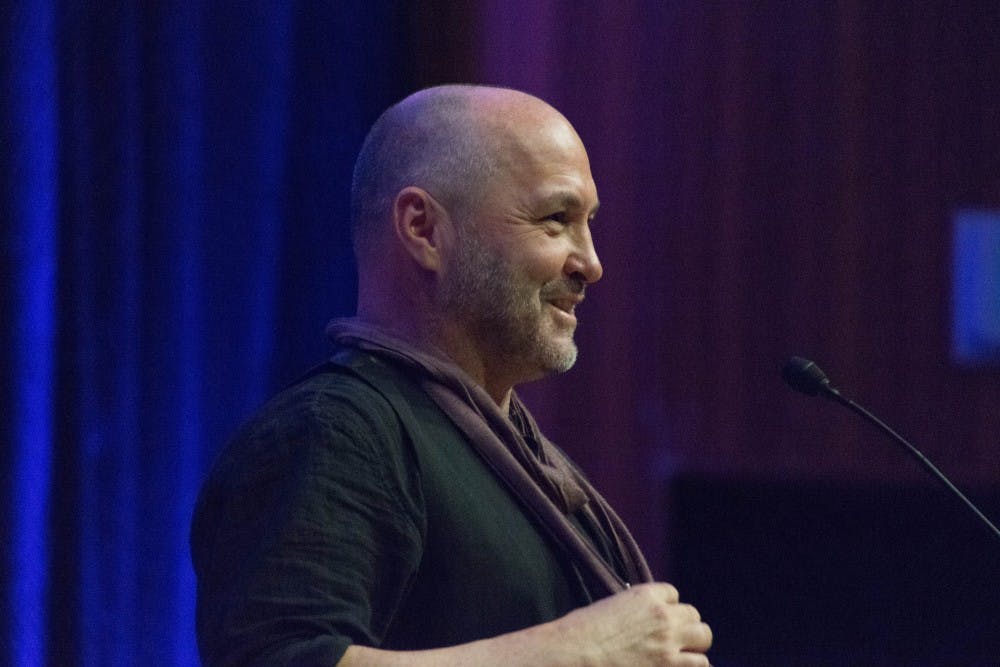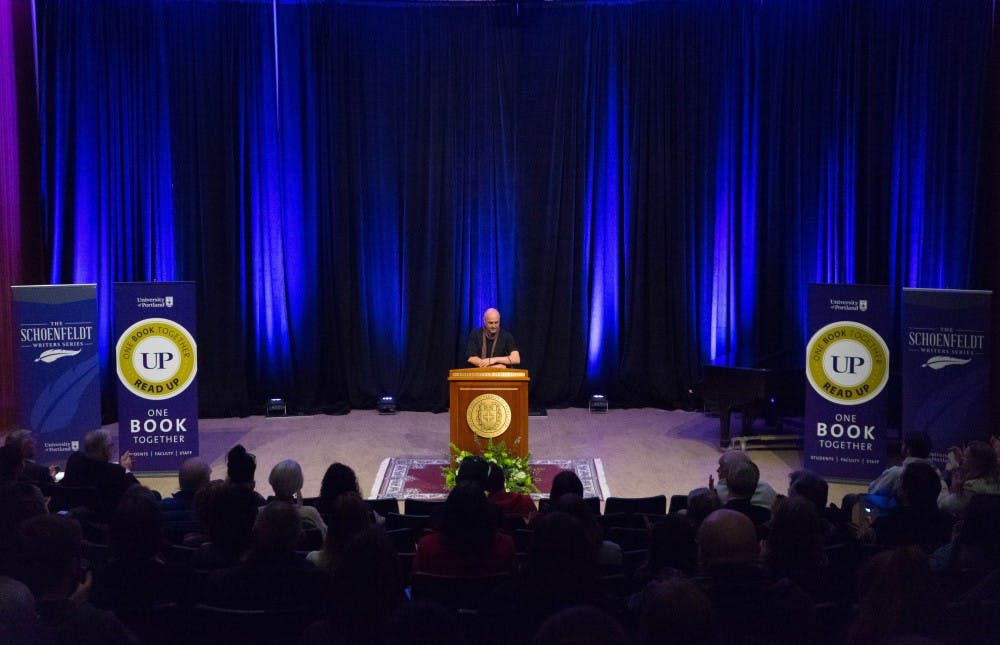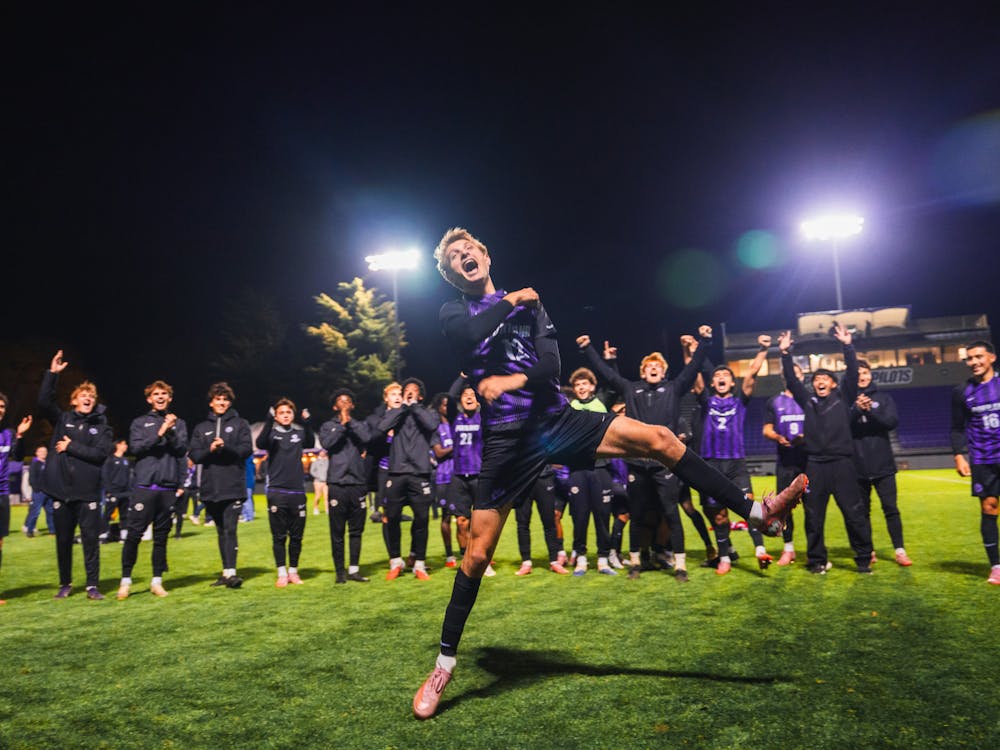Students, faculty members and members of the Portland community filled the Buckley Center Auditorium Wednesday night and waited to hear from the critically-acclaimed author, Colum McCann.
McCann’s book, Let the Great World Spin, was chosen for UP’s fifth annual Read UP book. This book also won the National Book Award for Fiction in 2009, the 2011 International IMPAC Dublin Literary award and is a New York Times bestseller. McCann is a literary fiction writer, originally from Dublin, Ireland, and is now teaching at Hunter College in New York City.
“Let the Great World Spin” is a compelling novel about 12 strangers living in Manhattan, right under one man crossing the twin towers on a tightrope. The 12 short stories about the daily lives slowly intertwine, as he uses 9/11 as a metaphor for hope and solace.
McCann spent all day Wednesday in UP English classrooms and Q&A sessions ,and he started the talk with a round of applause for UP students. Very impressed with UP students and faculty, he expressed how happy and grateful he was to be in Portland.
Over his hour-long speech, McCann read many of his pieces, and entertained the audience with his cheerful, Irish charm. Among sections from his book “Let the Great World Spin,” he shared a segment from a new novel that he recently finished a first draft of. McCann finished up the talk with an inspiring Q&A about his writing philosophies and the importance of stories.
Below are a selection of quotes from the talk.

On the idea for Let the the Great World Spin
On 9/11 after his father in law walked from one of the towers, all of the way to his house on the upper west side. This is when McCann’s 4 year old daughter saw the grandfather covered in smoke and ash.
“She did say said ‘no, no you don’t understand Dad, he’s burning from the inside out.’ And I thought ooo, I knew I would never forget that. And I knew, even that day, that I would want to write something about 9/11. I’m glad I didn’t write it straight away, because it would have been something completely different, I took five years.
“But that afternoon, wandering around the city I do remember the image that I read in the Paul Auster book about a guy called Philippe Petit who did the tightrope walk across the world trade center towers in 1974. And I thought that act of creation, that act of beauty, that artistic dare to walk across the air basically. On three-quarter inch steel rope, a quarter of a mile. That act of daring was in perfect opposition to the act of fear and hatred that brought the towers down. It seemed to me then, it would have to become part of a novel.”
On writing about women beautifully
“I kind of have a theory, and it goes back to our mother. It’s something very simple, so when I was 12 I went to school called St. Joseph’s Lucan college, which is in the suburbs of Dublin. And it was literally a three minute walk from my house. And most of the lads would hang around the yard for lunch time, we had an hour for lunch.
“But I would go home and every single school day from when I was 12 to 17. I would sit with my mother and have an hour at lunchtime. The sandwiches would be ready, lettuce and tomato sandwiches, with the crust cut off and a nice cup of tea. And I would sit and talk with her and I think part of my ability to write women has to do with I was around so many women like that. Also, I think women are more interesting than men. They are! They’re more complex.”
On being stuck in the beginning of a writing piece
“At the beginning it’s really, really difficult, you can go in thousands of different directions, but at the end, there’s only one way that you can go. So at the end of a novel, I’ll spend 15-16 hours a day sometimes working on the novel, just because I know where it’s going to go at the beginning, and much more restless and popping about at the end.
“But you kind of have to force yourself, what I call the terror of the blank page. You can’t afford to get up, to get out. The problem is, you have to be present for the moment and you never know when the moment is going to occur. And this is the really important thing, for you writers, work is not necessarily the stuff that arrives on the page. Eventually, if you develop that stamina and that perseverance and that desire for something to appear on the page, something will appear on the page.”

On writer’s block
“I used to think there was no such thing as writer's block. Then I suffered a period of writer's block, a few years ago after an incident that I had in New Haven, Connecticut. (It’s a) long, complicated involved story that I’ll tell you later at the pub. I went down and I was literally unable to write, until I got to do a victim impact statement in court and I wrote the story of this thing down.”
On stories
“I believe that stories are great sort of catharsis. As I said earlier, we are made of atoms, but we are also made of stories. And I’ve also said that after food and shelter and companion and that the ability to tell your story and even more, so have your story listened to is one of the great human dignities. And one of the things that we absolutely need.”
On his non-profit organization
“Narrative 4 is a non-profit global organization, where we get young people from across the world to exchange stories with one another in order to break down barriers and shatter stereotypes. They step into one another’s shoes and become one another and recognize their commonality by talking. We’ve exchanged tens of thousands of stories over the past few years and we hope to bring it here [to UP.]”
On fiction
“Fiction is a really interesting word. Fiction means to shape, it doesn’t mean to invent or whatever. It comes from the idea to actually shape. So fiction and non-fiction to me, can sometimes be the same thing. The real is imagined and the imagined is real. I stay very close to the actual truth. I want to get at the texture of the truth, facts sometimes can be mercenary things. You can use a fact, but texture is an altogether different form of truth and sort of a deeper form of truth. So sometimes, I think that fiction can get at a deeper truth than non-fiction can.”
Fiona O'Brien is a reporter for The Beacon. She can be reached at obrienf@up.edu.








